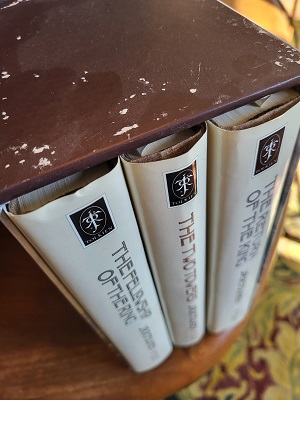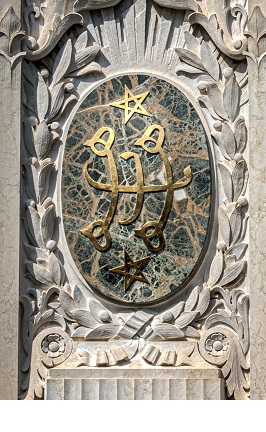
There comes a time each year
when the days grow cooler and the nights crisper,
when the light glows a certain golden color
and the frivolity of summer gives way to
the colors of autumn and the contemplation of winter,
that the need to take it up grows,
to dust it off, and live through it once again.
The pages are careworn, many dog-eared from lazy habit,
not a few stained with tea, coffee, or red-berry jam (or all three.)
Others are bent beyond repair (I often fell asleep reading it),
a number crayoned (my eldest),
some inked (my youngest),
and one missing (but I know that part by heart.)
The cover is scratched, the spine cracked,
the dust jacket in shreds, and a corner
of the end-map missing (it was one of them, I’m not sure which.)
But the words are there.
No other work flows so sweetly through my hands
at once so down-to-earth that it’s my loved ones squabbling
and yet so noble it calls me to stand taller just reading it.
Not a-one of those words I would change if I could,
for each is a jewel in the diadem of that world, placed, just so.
There are old words: doughty, gainsaid, and barrow,
and made-up words: mathons, lembas, and huorn.
There are foreign names, common names, hard-to-pronounce names,
high names, low names (Proudfoots! Proudfeet!)
and I quote them all half as well as I should like,
and remember half of them half as well as they deserve.
But I love them all.
The Lord of the Rings is a deserved classic, a hexalogy published in three volumes that has been re-discovered by each new generation since its publication in 1954. It gave birth to a wonderful series of movies (and for me a great Amazon series) and a whole genre of literature. While nothing I say of its greatness can exceed or best what has already been written of it, I cannot but help express my personal love of it.
The title of this poem comes from Tolkien’s opening sentence of his Foreword to the Second Edition, “This tale grew in the telling, until it became a history of the Great War of the Ring…”
Thank you for reading This too grew in the telling. I sincerely hope you have enjoyed it and I humbly appreciate your visiting the Book of Pain. As always, I look forward to your comments.
The photograph was taken in my home of yes, my well-worn personal copy. To see my photography blog, please visit the Book of Bokeh.
john
Photograph, poem, and notes © John Etheridge; all rights reserved. The poem and accompanying notes are licensed under the Creative Commons Attribution-Noncommercial-No Derivative Work 3.0 Unported License. This applies to all original written work found on this site unless noted otherwise. The attribution claimed under the license is © John Etheridge, https://bookofpain.wordpress.com. The photograph is not licensed for use in any way without the expressed consent of its creator.
















